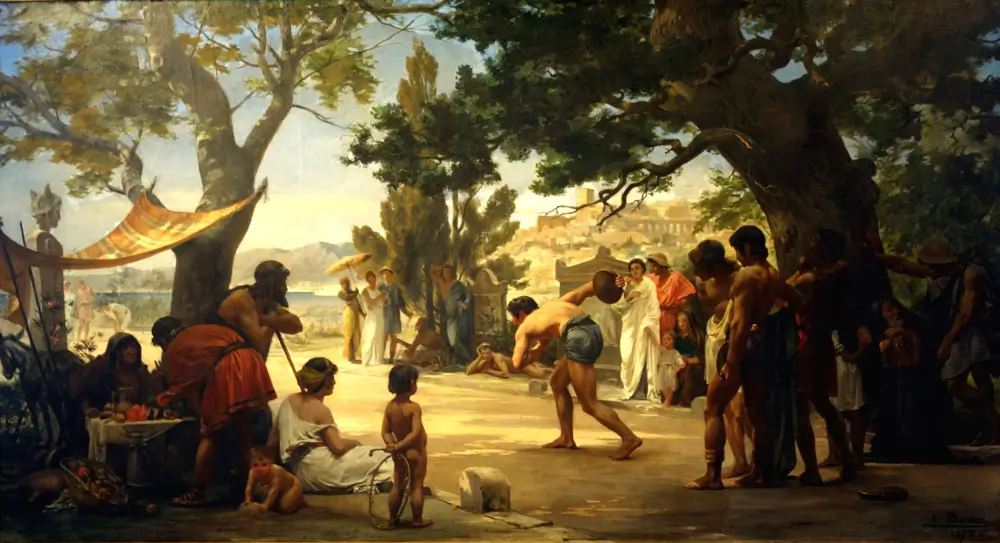When we think of ancient Greece, we usually picture great philosophers, fearless warriors, or majestic temples. But the Greeks were also masters of having a good time. Whether in everyday life or during special occasions, they embraced a rich variety of activities to relax, connect, and celebrate.
From lively gatherings with friends to spectacular festivals in honor of the gods, the ways in which the ancient Greeks enjoyed themselves might feel surprisingly familiar—reminding us that when it comes to having fun, humans haven't changed all that much.
Music, Parties, and Play
Music and dance were woven into the fabric of daily life. Whether it was a casual dinner or a festive get-together, someone was likely to pick up a lyre or play the aulos, a double-reed wind instrument, to set the mood.
For the Greeks, music wasn’t just background noise—it was melody, rhythm, poetry, and movement, all designed to energize the atmosphere. Families and friends might sing together, share tales of heroic feats, or engage in poetic recitation just for entertainment.
Lively conversation was considered an art form in a culture that valued rhetoric. Even a casual chat could quickly evolve into storytelling or philosophical debate—especially over a glass of wine.
The Legendary Symposion: More Than Just a Party
One of the most iconic forms of entertainment was the symposion—essentially an after-dinner drinking party. Picture a group of guests lounging on couches, sipping diluted wine from shallow cups, immersed in music, laughter, and spirited discussions.
Professional entertainers, such as female flutists (aulētrides), were often invited to elevate the mood.
Party games were all the rage too. A crowd favorite was kottabos, a kind of ancient Greek drinking game where players flung the last drops of wine from their cups at a target across the room—yes, wine pong, but make it classical.
Improvised poetry contests, witty toasts, and humorous storytelling were also staples of these gatherings.
Everyday Games and Pastimes
Entertainment wasn’t limited to wine-soaked evenings. In daily life, Greeks played simpler games, including board games like petteia or pessoi—strategy games that involved dice and pieces moved on a marked board.
Legend has it that the hero Palamedes invented such games during the Trojan War to help pass the time. Children had their own delights too—rattles, dolls, and outdoor games like tag or catch. A beloved game for both kids and adults was astragaloi, which involved tossing small bones or stones and catching them mid-air—a forerunner of modern jacks.
Public Festivals: When the Whole City Partied
The Greeks also loved public festivals, which brought entire communities together. Almost every city held annual religious festivals in honor of their patron deities, providing the perfect excuse for feasting, music, and grand parades.
In Athens, the springtime Festival of Dionysus was the biggest party of the year. Up to 16,000 citizens would gather at the hillside amphitheater to watch brand-new tragedies and comedies by famous playwrights as part of the Great Dionysia.
The celebration kicked off with a huge procession carrying a statue of Dionysus, accompanied by choirs, symbolic props, and endless wine-fueled revelry. For days, Athenians laughed, cried, and reflected together through theatrical performances, experiencing drama as both a sacred ritual and a form of mass entertainment.
These open-air theatrical festivals blended spiritual devotion with the excitement of a modern carnival—art, community, and joy coming together under the sun.
The Olympics: The Ultimate Entertainment Spectacle
Perhaps the most famous form of ancient Greek entertainment was the Olympic Games—less a sports tournament, more a full-scale cultural phenomenon. Every four years, athletes and spectators from across the Greek world converged on Olympia for a multi-day festival in honor of Zeus.
Spectators camped out, cheered wildly, and celebrated victors with garlands and showers of flowers. The atmosphere was electric. Vendors sold food, poets performed, and even wars were paused to ensure the games could go on.
Before television or stadium concerts, the Olympics were the epic stage of excitement and collective identity—friendly competition uniting people in a way that transcended politics and borders.
A Legacy of Celebration
The spirit of Dionysian festivity lives on in Greek culture today. With a reputation for zestful gatherings, tight-knit communities, and a love of life’s pleasures, modern Greeks carry forward a tradition that celebrates joy as an essential part of existence.
As the saying goes—life’s too short not to be Greek!










